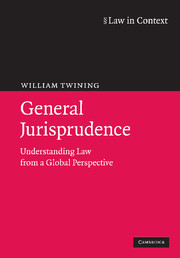Book contents
- Frontmatter
- Contents
- Preface
- Acknowledgements
- List of abbreviations
- Further abbreviations
- Part A
- 1 Jurisprudence, globalisation and the discipline of law: a new general jurisprudence
- 2 Analytical jurisprudence in a global context
- 3 Mapping law: Families, civilisations, cultures and traditions
- 4 Constructing conceptions of law: Beyond Hart, Tamanaha and Llewellyn
- 5 Normative jurisprudence, utilitarianism, and theories of justice
- 6 Human rights as moral, political and legal rights
- 7 Meeting the challenges to human rights: Griffin, Tasioulas and Sen
- 8 Empirical dimensions of law and justice
- Part B
- 14 Conclusion
- Bibliography
- Index
8 - Empirical dimensions of law and justice
Published online by Cambridge University Press: 05 June 2012
- Frontmatter
- Contents
- Preface
- Acknowledgements
- List of abbreviations
- Further abbreviations
- Part A
- 1 Jurisprudence, globalisation and the discipline of law: a new general jurisprudence
- 2 Analytical jurisprudence in a global context
- 3 Mapping law: Families, civilisations, cultures and traditions
- 4 Constructing conceptions of law: Beyond Hart, Tamanaha and Llewellyn
- 5 Normative jurisprudence, utilitarianism, and theories of justice
- 6 Human rights as moral, political and legal rights
- 7 Meeting the challenges to human rights: Griffin, Tasioulas and Sen
- 8 Empirical dimensions of law and justice
- Part B
- 14 Conclusion
- Bibliography
- Index
Summary
Introduction
In the first chapter I suggested that by and large Western traditions of academic law have been unempirical and narrowly focused, mainly concentrating on domestic state law of particular nation states and proceeding largely in ignorance of other legal traditions and cultures. This chapter deals with empirical understandings of legal phenomena. For reasons which will be explained below, I shall refer to this general area as empirical legal studies.
In earlier chapters we have already encountered some themes relevant to empirical perspectives on law and justice: the argument that there is a need for a closer connection between analytical jurisprudence and empirical legal studies especially in strengthening our stock of analytic concepts; we have seen that ‘the naturalist turn’ suggests (in different versions) a philosophical basis for continuity between analysis of concepts and empirical enquiries. In Chapters 1 and 3 we considered Dworkin's distinction between doctrinal and sociological conceptions of law and assessed theories that view law in terms of families, tradition (Glenn, Krygier) or culture (e.g. Friedman, Nelken, Bell, Cotterrell); Chapter 4 analysed attempts to construct general conceptions of law as a social institution (Hart, Tamanaha, Llewellyn, MacCormick, Twining), including the suggestion that these can be defended in terms of ‘thin functionalism’. We have also noted utilitarianism's concern with evaluating actual social consequences and recent attempts to bring empirical perspectives to bear on human rights and justice. It is now time to look more generally at empirical perspectives on law.
- Type
- Chapter
- Information
- General JurisprudenceUnderstanding Law from a Global Perspective, pp. 225 - 266Publisher: Cambridge University PressPrint publication year: 2009

